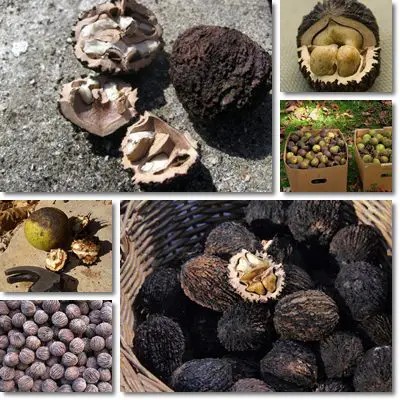A genuine food-medicine, the black walnut (Juglans nigra) is a precious fountain of youth. Found throughout the eastern regions of North America as well as Europe, black walnuts are not only extremely nutritious, but also provide relief and help improve a wide range of medical conditions. Being rich in Omega-3 fatty acids and magnesium, they are excellent for healthy arteries, cardiovascular, nervous system and muscle health.
Omega-3 fatty acids boast a strong antioxidant and anti-inflammatory action and benefit cardiovascular and nervous system health in particular. Black walnuts also help relieve constipation, protect the colon mucosa and aid digestion. They support the health of gut flora and are said to help with intestinal parasites. Last but not least, they have been shown to help improve sleep and reduce excessive sweating.

Although they are native to the eastern regions of North America, black walnuts have been successfully introduced in Europe where they now thrive alongside the common walnut tree, also known as Persian or English walnut, and the rarer red walnut and purple walnut tree species. Most trees begin to bear fruit in as little as 4-6 years, remaining productive well over 100 years of age.
What do black walnuts look like?
Unripe black walnuts have a green husk which gradually turns dark grey or black as the fruit matures. So you basically have a darker walnut. However, they have a much thicker shell which makes it more difficult to crack them open compared to regular walnuts.
What do black walnuts taste like?
Black walnuts are crunchy and boast a somewhat nuttier flavor than regular walnuts. However, both texture and taste depend immensely on the harvesting period. If harvested while the husk is still green, the kernels are softer, sweeter, milkier. Mature kernels have a more intense aroma. Remember that only the kernels (and apparently also the sap collected in early spring) are edible.
Black walnut husks, shells, leaves, bark and roots contain significant amounts of juglone. In its natural form, juglone inhibits the growth of other plants in the proximity of the tree, at the same time poisoning them. So make sure you let your black walnut have its space and don’t let your pets chew on any fallen husks.

Black walnuts vs English walnuts
What is the difference between black walnuts and English (Persian) walnuts? As mentioned above, black walnuts have a darker husk, thicker shell (and are thus harder to crack) and a slightly stronger flavor. Also, they appear to be richer source of vitamins B1, C and E, as well as iron, magnesium, phosphorus, potassium and zinc. Now let’s see what black walnuts are good for.
What are the benefits of black walnuts?
The following are the most notable 8 nutrition facts and health benefits of the black walnut:
Natural anthelmintic
Studies reveals that black walnuts act as a powerful natural anthelmintic, protecting against worms and intestinal parasites infestation due to the plant’s juglone content. Eating the kernels may have great results in lowering worm count and helping expel the dead parasites.
Efficient against intestinal Candida
Being a part of our natural gut flora, Candida is naturally present in our intestines. However, poor hygiene and a poor diet leading to inflammation may encourage the fungus to multiply in a fast rhythm, disrupting the sensitive balance of gut flora populations. This may lead to further inflammation and inflammatory diseases (such as Crohn’s disease). Due to its quite powerful anthelmintic properties, black walnuts help keep Candida populations under control.
Remedy for excessive sweating (hyperhidrosis)
Tannins are astringent natural compounds found in many plants, imparting a somewhat bitter taste to nuts, seeds, edible roots, fruit skins, etc. Research has revealed that the tannins in black walnuts may help calm hyperactive sweat glands, decreasing their activity. This would mean saying goodbye to uncomfortably sweaty palms and feet. However, it might be best to see your doctor first in order to pinpoint the exact cause of your hyperhidrosis and know whether or not it requires medical attention.
Natural laxative properties
Rich in dietary fiber (6.8 g) and healthy fatty acids (51.8%), black walnut kernels help relieve constipation. Dietary fiber adds bulk to stools while fats lubricate the intestines, encouraging easy and frequent bowel movements. Regulating intestinal transit and enjoying regular bowel movements reduces colon exposure to toxins ensuring its health. English walnuts are similarly beneficial for constipation relief.
See the benefits of English walnuts.
Digestion aid
The fiber in black walnuts supports healthy gut flora, populations of microorganisms found naturally in our digestive tract, responsible for good digestion and vitamin absorption. Healthy gut bacteria also helps produce (synthesize) vitamin K and B vitamins such as biotin (vitamin B7 or vitamin H), contributing immensely to keeping in good health.
Promotes cardiovascular health
Black walnuts are a rich source of Omega-3 fatty acids and magnesium. Omega-3 acts as an antioxidant, maintaining blood vessels healthy by preventing oxidation processes. Because it also contributes to supporting brain development and nervous system activity, it represents an essential nutrient for expecting mothers as well as young children.
Magnesium is responsible for regulating electrical impulses sent from the brain to the muscles, in this case to the heart muscle. Having enough magnesium in your diet means that your heart can function optimally and effortlessly (no palpitations, no shortness of breath, no nothing). Also see the benefits of red walnuts.
Anticancer properties
Research suggests that certain compounds in black walnuts are capable of inducing apoptosis (programmed cell death) in cancer cells, thus stopping their proliferation. Cancer cells are basically sick cells that forget to die when their time is up and keep replicating, causing tumor growths known as cancer.
Many fruits, vegetables, nuts, seeds and herbs have been shown to contain such compounds which induce apoptosis in sick cells. However, modern medicine cannot yet grasp how healthy eating can prevent and cure cancer. Still, there have been documented cases where terminally ill people have successfully healed themselves by simply changing their diets completely.
Improves sleep
Black walnuts are a rich source of melatonin, a hormone and antioxidant known to regulate day-night cycles, protect cells and DNA and reduce inflammation levels. Having enough melatonin in your system is the key to sleeping better. But because the body decreases production as we age, including either plant sources such as black walnuts or tryptophan or melatonin food supplements in your diet might help improve your sleep considerably.
Also see the benefits of cherries and cherry juice for sleep.
Conclusion
Overall, black walnuts are a great food, rich in essential nutrients nutrients and antioxidants, a genuine medicinal plant. Regular consumption is wholeheartedly recommended for cardiovascular, nervous system, digestive, bone and muscle health, provided, of course, you do not suffer from allergies to nuts. As for black walnut supplements, know they are made from the husk and have strong irritant properties. There are concerns of allergic reactions and possibly a higher risk of skin cancer from black walnut supplements or preparations for topical use.
